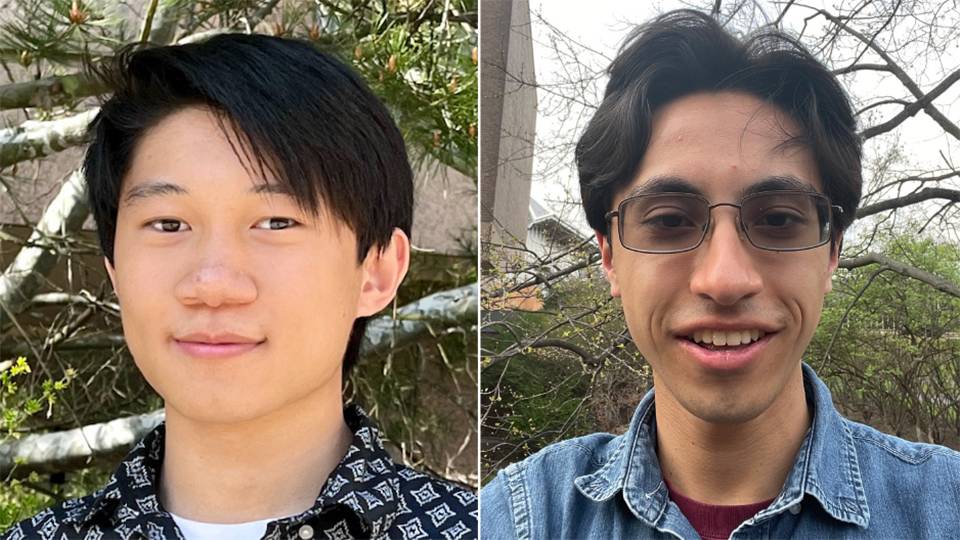Alice Lin
Princeton University senior Alice Lin, a concentrator in mathematics(Link is external) who plans to pursue a career as a research mathematician, has been selected as one of this year’s Churchill Scholars.
Lin is one of 15 scholarship winners who will spend a year studying at the University of Cambridge while living at Churchill College, which focuses on STEM subjects. She plans to complete Part III of the Mathematical Tripos, which confers a Master of Advanced Study in mathematics.
“For a long time, I believed I would study insects, having spent much of my childhood digging deep into the earth, dirt caked under my fingernails, watching the earthworms and earwigs wriggle back into the darkness,” she said. “I have come to think of being a research mathematician as its own kind of digging. I am laboring away to glimpse wonderful things that have not yet been brought into the sun. I want to make a career out of this new kind of unearthing in number theory or arithmetic geometry.”
The Churchill Scholarships, first awarded in 1963, were set up at the request of Sir Winston Churchill as part of his vision for a scientific exchange between the United States and the United Kingdom. The scholarships are granted to “exceptional” students from the United States who wish to pursue graduate studies in the sciences, mathematics or engineering.
This year 127 nominations were received from 82 participating institutions — the highest ever in the history of the award. Forty-three Princeton students have won scholarships over the years, the most at any institution.
Lin, of Berkeley Lake, Georgia, said she looks forward to strengthening her skills in algebra and number theory and challenging herself to learn new techniques from other areas including representation theory, algebraic topology and differential geometry. “A strong understanding of these many disparate fields is essential if I am to tackle modern questions in my subfield,” she said.
Lin completed her junior paper at Princeton with Yunqing Tang(Link is external), an instructor of mathematics. Tang said Lin’s work was at the level of the first serious project that might be taken on by a graduate student, if not more difficult.
“This project requires deep understanding of techniques from various areas in arithmetic geometry,” she said. “Therefore, it is very impressive that Alice carried out this project successfully as an undergraduate.”
Tang said Lin asked good questions, and that she was not satisfied following her suggestions without thinking about them. “Overall, I think Alice has the potential to be an excellent mathematician,” she said.
With funding from the National Science Foundation’s Research Experiences for Undergraduates, Lin worked with Ken Ono, the Asa Griggs Candler Professor of Mathematics at Emory University (he has since been named the Thomas Jefferson Professor of Mathematics at the University of Virginia), and Liljana Babinkostova, professor of mathematics at Boise State University, submitting research papers with both.
She received an Outstanding Poster Award at the Joint Math Meetings in January 2019 for “Asymptotic Bounds for Extended Elliptic Pseudoprimes,” a poster on research she conducted at Boise State University.
A member of Mathey College, Lin has served as a teaching assistant in mathematics and as advising chair for the Princeton Math Club. She is a violinist for the Princeton University Orchestra and president of the Princeton Bee Team, Princeton’s beekeeping club, which she re-introduced at the University in 2018.
Lin also serves as an instructor for the Art of Problem Solving Academy, teaching a middle school competition math class.
She is the recipient of the Peter A. Greenberg ’77 Prize from the Department of Mathematics and the Shapiro Prize for Academic Excellence.
The Churchill Scholarship pays for a year of tuition and fees, living expenses, travel, and at times provides a research grant. The program is administered by the Winston Churchill Foundation of the United States.
The 15 Churchill Scholars will be joined in their cohort by the recipient of the Kanders Churchill Scholarship in Science Policy.



